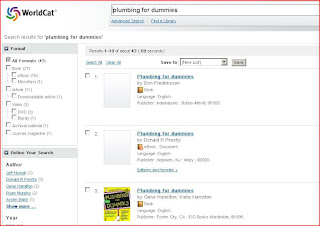We're an Internet savvy culture now. Even those of us who cheerfully admit to being hopeless with technology know what an email is for (although maybe not how to open one!) And we all know about Google.
Google is THE search giant, the biggest and most well known of the search engines, the King of the SERP's (Search Engine Results Pages). It dominates Internet search, commands respect from web designers hoping to make it to the fabled Google Front Page for their customers and has even gone toe to toe with the heavy hitters of the mobile phone world.
But the Internet is a far more mysterious place than it at first appears. Buried far in the corners, in the damp dark places hidden by Google and Windows, there lies the alternative search engine. Strange things with unfamiliar logos and confusing names that shuffle and scurry in the shadows. Most of them are for niche subjects, like Slidefinder which comes in 35 languages all dedicated to finding a truly bemusing number of PowerPoint presentations on any subject, or Retrevo, your go-to search engine for electronics. Knowing what, and where they are can make for a fascinating trawl through the Internet.
Lets drag the top few of them into the light.
5) Brainboost
This remarkable engine not only gives you the answer you are looking for, in plain English, but also gives you half a dozen links to related questions that your original query might prompt. So from "why do birds fly?" we get a concise answer and a prompt to further questions from the philosophically fascinating "If a fly can fly can a bird bird?" to the science teachers next paper "What bird do not fly?" Grammar errors excluded, that's a pretty good range of followup questions.
4) WorldCat
Brilliant for students and the studious alike, this engine is quite simply a library finder. Think of a book, any book, type it in and let WorldCat find it for you. Tap in your location and it will find the nearest copy. In a world of electronic information this may not seem that useful, but it bears remembering that a great deal of books aren't electronic and most older papers and books needed by students will also fall into that category.
3) Dogpile
Dogpile is what's known as a meta search engine. This means when answering your searches it grabs relevant information from many other search engines, including Google, Bing, Yahoo!, MSN and so on. This is important when you realise that websites have to be submitted to a search engine before it can display them in search results. Since popular search engines vary between countries and preferences vary between web designers, it's nice to access all the other engines at once and without having to go looking for them.
2) Wikipedia
Originally considered as an on line encyclopedia, Wikipedia has blossomed and grown from these humble beginnings to become a monster of search in it's own right. Estimating over 4, 000, 000 articles in English alone, with more being added every day, it is hard to imagine a search term that isn't represented somewhere. Whilst the quality of the information in the return may sometimes be suspect, owing to the Wiki gimmick that allows anyone to edit it's pages, there are always useful links to be found and often the information itself answers the search query sufficiently. Plus, you generally learn something new whilst searching! Beats scrolling through pages of unhelpful SERP's looking for an obscure company name or definition.
1) Infomine
This powerful engine deals in the other world, the world which search engines traditionally are forbidden to enter. Known as the Invisible Web, the Deep Web, the Undernet and other spooky and tempting names, it is the home of password protected library databases and company intranet that is private and uncrawled. Whilst not illegal to search these things, the spiders and bots that work for Google and friends do not normally have easy access and so ignore them. Estimates on the amount of info hidden in this Deep Web are staggering - around 7,500 terabytes were thought to be lurking there back in 2001. If information is currency, there's gold in them there hills... plus, you get to feel like a movie hacker whilst using it!
For quality web design and high search results, visit www.bathbusinessweb.co.uk today or find us on Facebook and twitter
See also:
The battle of the browsers
Beware of Google pay-per-click











No comments:
Post a Comment